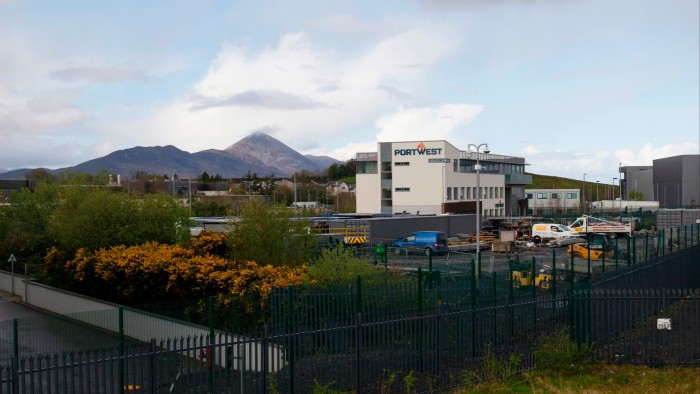The peak of Croagh Patrick dominates the skyline of Westport, a pretty town on Ireland’s Atlantic coast. Dominating its economy, on the other hand, are the not-so-pretty windowless grey factory units that manufacture the world’s entire supply of Botox for a US company. And Donald Trump wants pharma production to move home.
The US president this week stepped up his criticism of American companies’ Irish operations. His threats to impose tariffs to encourage investors to reshore are weighing on the 7,000 people of Westport: some 1,500 of them are employed by AbbVie to make the wrinkle-erasing drug.
“People are holding their breath,” said Geraldine Horkan, chief executive of the Westport Chamber of Commerce, who worked at Allergan before its takeover by AbbVie in 2020. “It’s like an aeroplane circling in a holding pattern.”
Ireland has become a major base for US pharma companies including Pfizer, Eli Lilly and Johnson & Johnson.
Besides Botox — which leaves Westport as vials of powder to be mixed with saline solution before injection into celebrity foreheads or to treat cerebral palsy or muscle spasms — factories in Ireland churn out active ingredients for drugs including Viagra, weight-loss remedy Mounjaro and statins for high cholesterol.
Ireland has been rushing to export pharmaceuticals to the US before any tariff axe falls: in February, 91 per cent of all its goods exports to the US were chemicals and related products, which include medical and pharma goods. Irish pharma exports to the US in the first two months of the year reached nearly €20bn, compared with €44bn for the whole of last year, according to official trade data.
Despite Trump’s imposition of global tariffs, which he last week paused at a baseline global rate of 10 per cent pending talks on trade deals with the EU and other countries, pharmaceutical goods are currently free of tariffs.
Ireland’s foreign and trade minister, Simon Harris, says it would be “inappropriate” and “bizarre” for the US to impose tariffs while negotiating.
But a reprieve looks increasingly unlikely. The US commerce department has launched a “Section 232” investigation into the sector which would allow the president to restrict imports deemed a threat to national security.
That could potentially lead to tariffs in the “next month or two,” US commerce secretary Howard Lutnick said.

Trump, who used a meeting with Taoiseach Micheál Martin last month to complain that Ireland “has got the entire US pharmaceutical industry in its grasp” on Monday lashed out at the sector again.
“We don’t make our own drugs, our own pharmaceuticals any more. The drug companies are in Ireland and they’re in lots of other places — China,” he said.
Allergan opened a plant to produce contact lens solution and eyecare products in Westport in 1977. Now, the real money-spinner is Botox but the facility also produces eyecare pharmaceuticals and 70 per cent of Westport’s production is sold in the US, according to the Irish operation’s most recently filed results, from 2023.
Botox now has competitors making chemically similar products — rival drugs include Dysport, produced by France’s Ipsen and Xeomin from Germany’s Merz — But AbbVie says it is confident it can maintain its leadership position.
While Botox for cosmetic purposes brought in $2.72bn in net revenues last year, according to AbbVie, therapeutic Botox netted $3.3bn. Tariffs would boost the price of drugs for users, and cosmetic applications are not covered by US health insurance.

AbbVie — which does not officially disclose where it makes its products — invested €160mn in a second biologics facility in Westport 2020 and production cannot be “shifted overnight”, said Peter Flynn, a local councillor and former international director of tax and finance at Allergan. “[Trump’s] cheap remarks aren’t doing anyone any favours,” he said.
“With the automation of production lines and ever increasing quality standards, the focus in Ireland has changed with multinationals now employing highly qualified and experienced people, many of whom play a key role in R&D,” he added.
Ireland is the world’s third-largest pharma exporter, with 90 sites that supply the EU and other countries as well as the US. More than €10bn has been invested in the sector over the past decade. Denmark, Switzerland and Singapore are other countries with large pharma sectors now in Trump’s sights.
Many drugmakers have responded by announcing large investments in the US. Johnson & Johnson has pledged $55bn over the next four years, Eli Lilly is investing $27bn, while Swiss drugmaker Novartis said last week it would invest $23bn in manufacturing and R&D.
Pharma bosses have written to European Commission President Ursula von der Leyen warning that Europe risks losing €100bn in investment and R&D spending over the next five years, as US tariffs and proposed EU reforms on intellectual property protections make the EU less attractive.

But Ireland is uniquely vulnerable to any Trump action: besides big pharma, it hosts the European headquarters or large operations of US tech giants, which von der Leyen has threatened to target if tariff talks fail.
Tech and pharma make huge corporation tax contributions that have delivered enormous budget surpluses.
Botox has also helped Westport grow into a colourful, bustling town of boating festivals, restaurants, hotels, chic shops and traditional bars.
As well as being the town’s biggest employer, the company has been a prominent supporter and sponsor of local initiatives and sports teams. “It would be a massive loss,” if they left, said Adrian Noonan, owner of the Knockranny House Hotel, the town’s first four-star hotel, located beside the factory, who has hosted visiting executives and board meetings.
New pharma plants need regulatory approval, which could mean years of delay in transferring production to the US, but analysts said executives would by then have already slammed the brakes on future investment plans in Ireland.
“We’re all extremely worried,” said Philip Heaney, a local pharmacist. “They talk about Canada being the 51st [US] state. But with pharma, we nearly are.”

